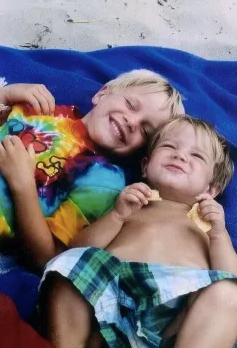The Up Deeds blog
Our blog posts are created by those that share the same call to give back to others.
We give them the full credit they are due, and links so you can benefit from other information they share.

People are Good, and I can Prove It
by Glenn Cort
Three sixteen-year-olds from Boston Preparatory Academy compiled the following article based on their research, all of whom have been working this past summer as interns for Getting Along Academy. Getting Along Academy is committed to researching certain important truths. One of these truths is that people are born good. Why we DO NOT rely on this fact, is not the subject of this article.
This article examines significant psychology, neuroscience, and anthropology studies that help us understand that humans are born with a tendency towards good rather than bad behavior and that our good traits far outweigh our bad ones. At least at the time of our birth…
From Delilah:
In 2010, Paul Bloom, a developmental psychologist at Yale University, conducted experiments to see if babies have an innate sense of morality. In one experiment, six-month-old infants watched puppet shows where one puppet helped another, while a different puppet acted in a mean way. Remarkably, the babies showed a clear preference for the helpful puppet over the mean one. The babies’ preference for the helpful puppet indicates that even at a very young age, humans can distinguish between positive and negative actions. This challenges the idea that people are born as blank slates, neither good nor bad, and instead suggests that we have an inborn moral compass.
Another important study comes from Molly Crockett. In 2008, her team researched how the brain responds to fairness. The researchers used MRI scans to observe brain activity when participants were treated fairly or unfairly. The results: the brain's reward system was activated not only when participants received personal rewards but also when they witnessed fair treatment of others. These findings help prove that the human brain is naturally wired to appreciate fairness and cooperation and suggest that people are born with a tendency to act in fair, prosocial ways. This biological inclination towards fairness supports the idea that humans are not inherently bad but are instead predisposed to positive social interactions.
In 2006, Anthropologist Joseph Henrich led a comprehensive study on altruism across 15 small-scale societies around the world. Henrich's study found that while the level of altruism varied among different cultures, altruistic behavior was present in all of them. This universality suggests that the tendency to help others without expecting anything in return is a fundamental aspect of human nature. If altruism is a common trait across all human societies, it indicates that people have an inherent capacity for goodness.
The studies by Bloom, Crockett, and Henrich provide strong evidence that humans are born with an innate sense of morality, fairness, and altruism. While individual actions can be influenced by various factors such as environment and personal experiences, the inherent tendencies towards fairness, cooperation, and altruism suggest that people are fundamentally born good.
References
- Bloom, P. (2010). The Moral Life of Babies. *The New York Times Magazine*. Retrieved from [nytimes.com](https://www.nytimes.com/2010/05/09/magazine/09babies-t.html)
- Crockett, M. J., et al. (2008). Serotonin Modulates Behavioral Reactions to Unfairness. *Science*, 320(5884), 1739-1742.
- Henrich, J., et al. (2006). Costly Punishment Across Human Societies. *Science*, 312(5781), 1767-1770.
From Libinn:
According to science, people aren’t born bad. Instead, their behavior is shaped by a combination of genetic, environmental, and social factors. Negative behaviors often come from certain experiences such as trauma, neglect, or exposure to violence. Additionally, psychological and sociological studies suggest that empathy, compassion, and a sense of justice are innate human traits that can be nurtured through positive interactions and supportive environments.
“During this stage, children also become less egocentric and begin to think about how other people might think and feel” (Piaget) Source number 1; https://www.verywellmind.com/piagets-stages-of-cognitive-development-2795457
“Erikson’s theory outlines 8 stages of psychosocial development from infancy to late adulthood. At each stage, individuals face a conflict between two opposing states that shapes personality.”Source number 2: https://www.simplypsychology.org/erik-erikson.html#:~:text=Erikson%20maintained%20that%20personality%20develops,or%20negatively%20affect%20personality%20development.
“According to Bandura, people observe behavior either directly through social interactions with others or indirectly by observing behaviors through media.” Source number 3: https://www.verywellmind.com/social-learning-theory-2795074#:~:text=According%20to%20Bandura%2C%20people%20observe,by%20observing%20behaviors%20through%20media.
From Sharon:
My research presented to me that people are born good. But based on the environment and upbringing, they can become evil. A study explains, “Here we show that 6 and 10-month-old infants take into account an individual’s actions towards others in evaluating that individual as appealing or aversive. Infants prefer an individual who helps another to one who hinders another, they prefer a helping individual to a neutral individual, and they prefer a neutral individual to a hindering individual.” (Hamlin et. al.). Babies are interested in someone who does the right thing rather than the wrong thing.
A book by a biologist at Harvard, E. O. Wilson, “Sociobiology: The New Synthesis,” explains, “…certain types of social behaviors— including altruism—are often genetically programmed into a species to help them survive.” This allows us to see wholesome character traits such as altruism can be passed down for the efficiency and survival of a community and people. This explains that people’s good will surely be passed down because it's essential to the survival of society. This can be seen again in studies performed like the “public goods game”. Each study had group-based financial decision-making tasks and required participants to choose between acting selfishly and maximizing group benefits at the cost of the individual. Faster decisions were associated with more cooperation and better effects for the group. This shows that human instinct and impulse is to do what's better for the group and they automatically want to do what's better for others rather than themselves.
- Barker, Eileen, and Edward O. Wilson. “Sociobiology: The New Synthesis.” British Journal of Sociology, vol. 26, no. 4, Dec. 1975, p. 501. https://doi.org/10.2307/589826.
- Hamlin, J. Kiley, et al. “Social Evaluation by Preverbal Infants.” Nature, vol. 450, no. 7169, Nov. 2007, pp. 557–59. https://doi.org/10.1038/nature06288.
- Ward, Adrian F. “Scientists Probe Human Nature--and Discover We Are Good, After All.” Scientific American, 20 Feb. 2024, www.scientificamerican.com/article/scientists-probe-human-nature-and-discover-we-are-good-after-all.
There is not any more important fact for us to be organizing our society around, than the fact that people are born GOOD! Please add any research, you might have, in support of this contention, or offer scientific facts that would refute it. Thank you.
People Are Good: 100 True Stories to Restore Your Faith in Humanity
It Doesn't Take Much to Make the World a Better Place
People Are Good is a collection of stories that unites us all. In today's world, it is easy to focus on what is going wrong instead of what is good and going right. Small acts of kindness are really the big things that change our outlook and ultimately change the way we live in the world. This global movement is sure to restore your faith in the human spirit and remind us that little things are a big deal.
The nonprofit that sells this book and so many more donates its proceeds to independent bookstores.

